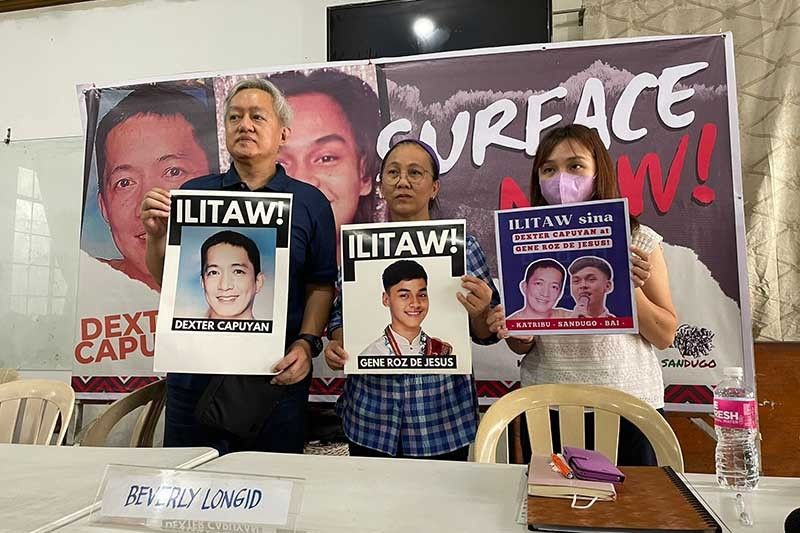Kin, rights groups call on gov’t to surface missing IP rights activists

MANILA, Philippines — Families of missing activists Gene Roz Jamil “Bazoo” De Jesus and Dexter Capuyan called on authorities to surface the indigenous peoples’ rights advocates nearly two weeks after they disappeared in Rizal.
De Jesus and Capuyan, former student leaders of the University of the Philippines Baguio, went missing on the evening of April 28 in Taytay town.
In a briefing Wednesday, families and colleagues of De Jesus and Capuyan stressed that they are activists, not terrorists. They believe the two were abducted by state forces for their activism.
De Jesus is a staff of the Philippine Task Force on Indigenous Peoples Rights (TFIP), while Capuyan was a former Cordillera-based activist.
According to IP rights advocate Beverly Longid, De Jesus and Capuyan were taken by men who identified themselves as operatives of the police’s Criminal Investigation and Detection Group using three vehicles.
Days before the two activists went missing, “unfamiliar” individuals suspected as state agents were observed in the vicinity of the area where they were abducted, Longid added.
Cordillera activists
Mercedita De Jesus returned to the Philippines from Italy on Monday to join the search for her missing son Bazoo, whom she described as a “smart, kind, peace-loving servant leader.”
De Jesus served as the chair of the Council of Leaders at UP Baguio and regional convenor of the National Union of Students of the Philippines. He finished Bachelor of Arts Communication major in Journalism in 2016 as a cum laude.
“He is not a terrorist. He is an activist who truly advocates for the better future of the youth and minorities,” De Jesus said in Filipino as she called for the public’s support in finding her son.
“We hope the day will come that our son will return to us, that we will be able to hug and kiss him. And I know that if he comes home, he will not stop pursuing his advocacies because we know that he will not stop until he sees a ray of hope for change in society,” she added.
Eli Capuyan, meanwhile, called his older brother Dexter a “compassionate individual.”
“Our father encouraged him to become a lawyer so he can help those in need, but he did not follow him. Instead, he continued his work of directly assisting those in need and providing solutions to their problems,” Capuyan said.
Capuyan, a Bontoc-Ibaloi-Kankanaey, was a former editor-in-chief of Outcrop, the official student publication of UP Baguio.
Capuyan has been accused of being a “communist terrorist group personality”— the government term for the Communist Party of the Philippines, New People's Army and National Democratic Front. Red-tagging or labeling an individual or an organization as a member or supporter of the armed movement has resulted in harassment, threats or, in worse cases, death of subjects.
His photo is included in the poster circulated by the Department of National Defense and the Department of the Interior and Local Government with a P1.85 million bounty.
Call to CHR
Capuyan and De Jesus are the seventh and eighth persons involuntarily disappeared under the Marcos Jr. regime, according to human rights monitor Karapatan.
Groups called on the Commission on Human Rights to conduct an urgent and impartial investigation into the disappearance of the two activists.
“We call on the CHR to help us. This is their mandate. They have the power to visit camps, to inquire, to conduct an investigation under the Anti-Enforced Disappearance Act,” Cordillera Human Rights Alliance spokesperson Caselle Ton said.
Families and colleagues of De Jesus and Capuyan, accompanied by human rights groups and lawyers, have gone to Camp General Mateo Capinpin in Tanay, Rizal, Camp Vicente Lim in Calamba, Laguna, Camp Allen and Camp Dangwa in Benguet, and Camp Crame, Camp Aguinaldo and the National Intelligence Coordinating Agency in Quezon City to check if they have the two in their custody.
However, none of the police or military units have accomplished the forms provided by the families and their team as per the Anti-Enforced Disappearance Act, nor have provided information on their whereabouts. Under the said law, government agencies, especially those in the security sector, should provide necessary assistance to any inquiring parties.
- Latest
- Trending


































